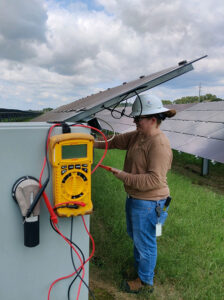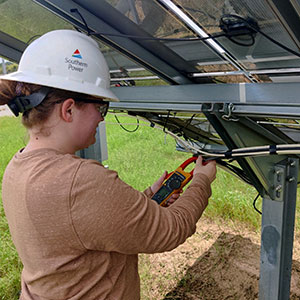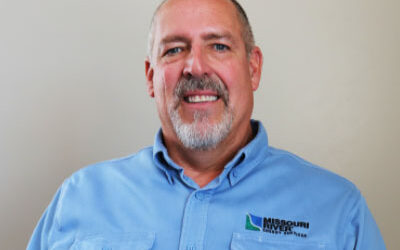Kiera Nelson’s day literally starts with the sun.
As a solar technician for Southern Power, Nelson’s necessary tasks working with solar inverters – the brains of a solar power installation – may start sooner in summer when the sun rises earlier or later in winter when days are shorter.
 “We always watch for start-up issues with inverters, and that only happens when the sun rises,” she says. When the sun emits enough power onto Earth each second to satisfy the entire human energy demand for over two hours, a solar technician must respect the sun’s schedule. And the future of solar energy is bright: The amount of power collected from solar energy worldwide increased 300-fold from 2000 to 2019.
“We always watch for start-up issues with inverters, and that only happens when the sun rises,” she says. When the sun emits enough power onto Earth each second to satisfy the entire human energy demand for over two hours, a solar technician must respect the sun’s schedule. And the future of solar energy is bright: The amount of power collected from solar energy worldwide increased 300-fold from 2000 to 2019.
Alternatively, what are Nelson’s least favorite days? “The rainy ones,” she says. “Sure, there’s stuff to do in the office, but we can’t go out into the field when it’s raining.”
Southern Power, a subsidiary of Southern Co., currently owns or operates more than 2,395 megawatts of solar generating capacity at 28 facilities operating in California, Georgia, Nevada, New Mexico, North Carolina, and Texas. Nelson works at the Georgia facility in Taylor County.
We talked with Nelson to find out more about the work a solar technician does and its importance in the future of energy.
What is your typical day like?
 I work with utility solar inverters that take DC energy from the sun and convert it to AC, which is what a home runs off of.
I work with utility solar inverters that take DC energy from the sun and convert it to AC, which is what a home runs off of.
Every day at work is different. Typically, I come in and our small group goes through a safety discussion and then makes plans for the day, determining what needs to be done and when because timing is important with solar equipment. The time of year can vary when our days in the field begin as well.
The goal is to keep the plant running as efficiently as we can. We watch for start-up issues, we look for equipment that’s not tracking correctly, we troubleshoot areas and fix things like breaker trips and motor stalls, and we also conduct preventive maintenance to prevent issues that can arise.
When we do find issues, we have to take care of them at night or early in the morning before startup, so it doesn’t affect production.
What kind of training brought you to your role?
I used to work in automotive manufacturing at a metal stamping plant. But Southern Power is a well-known employer in this area, and I’d been looking for opportunities there because it’s a great company with good benefits. I wanted to find a place I could retire from. I saw the job posting for a solar technician and got it.
I also have an associate’s degree in electrical engineering. For anyone interested in this role, I would suggest a technical, electrical, or mechanical background.
What’s the more rewarding part of your work?
I enjoy the pace of the job. I stay pretty busy and there’s always something to do. I’m never bored, and I’m always learning something. There are enough new things to learn that the job constantly changes and evolves.
What are you most proud of doing in your work so far?
I’ve enjoyed working on a few improvement projects in my time here that I’m proud of. I can say I helped contribute to making the plant run better and more efficiently and that makes a positive impact on our solar facility. One specific improvement project was when we had an inverter that had some issues with overheating. I was able to pull in some temperature probes and install them close to the affected equipment to monitor the temperatures remotely so we could get an alarm if the temperatures started to rise and address the issue before something happened, such as disconnect that one inverter for safety.
What would surprise people most about your work?
When people think about solar power, they think about the solar panel on their roofs. But while a house may have solar panels that each produce less than 1 megawatt (1 megawatt is enough to power 160 homes), I work on a fleet of utility-scale solar panels that each produce anywhere from 2 to 140 megawatts.
What is next for you in your career path?
I definitely plan on staying at this company. But I see myself moving into a controls or SCADA position. SCADA stands for supervisory control and data acquisition systems. They are used in solar power plants for monitoring, control, and remote communication. Solar technicians monitor the plant through SCADA, but a controls/SCADA technician would make changes and improvements.
What advice would you give to people interested in getting into a job like yours?
Do your research. Learn about the industry. There is a lot of information out there. Don’t be afraid to ask questions, especially once you get into the role. It’s the easiest way to learn.
The more we can use solar and wind, the better. There is a lot of attention being spent on developing storage systems for renewables to help with really cloudy days or days where there’s not a lot of wind. It’s an exciting time to be in renewable energy.




